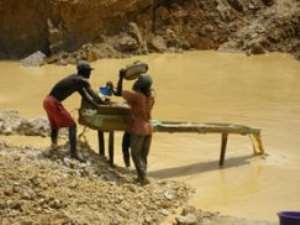
The Ghana Water Company Limited (GWCL) has shut down its plant at Kyebi in the East Akyem municipality of the Eastern Region as a result of the uncontrolled activities of illegal miners also known as ‘galamsey’ operations in the Birim River.
According to officials of the company, the Birim River has become too polluted to be treated for both domestic use and drinking.
The plant was shut down as efforts by the Municipal Assembly, the Ministry of Water Resources, Works and Housing, as well as National Security, failed to address the issue.
Residents at Kyebi depend on limited boreholes for the supply of water. Staggering reports from the Eastern Regional Office of the GWCL indicates that there are two boreholes for a population of about 10,000.
According to a Habitat for Humanity report, 64 per cent of the popuation is made up of women.
“The Birim River is the only source of water that we can treat for distribution,” the Quality Assurance Manager of the Eastern Regional GWCL, Mr Moses Paintsil, stated when members of the Ghana Water and Sanitation Network (GWJN) paid a visit to the region to familiarise themselves with the company’s operations and challenges.
The visit was organised by the Ministry of Water Resources, Works and Housing under the Improvement of Water Sector Performance Manangement Framework. It was aimed at providing water and sanitation journalists with first-hand information with regards to access to water and sanitation in the Eastern and Volta regions.
Mr Paintsil explained that the Birim river bed was rich in gold ore and the galamsey operators therefore mined deep into the river, sometimes diverting the course of the river. He said the mineral-bearing rocks contained high levels of iron and flouride which affected the quality of water even after treatment.
“Sometimes even after treatment, there is still high levels of flouride and iron in the water and that was why we had to shut it,” he said.
The Eastern Regional Production Manager of the GWCL, Mr Kofi Ansah Asante, in recounting some of the measures they had already taken to resolve the issue, stated that there had been occasions when equipment of the operators were seized in an attempt to deter them but even that did not work.
There are uneven provision of boreholes in the region. At Asuom and Akim Swedru for instance, there is only one borehole each, two at Kade and Akim Aboabo and six at Akim Oda. According to Mr Ansah Asante, six new boreholes are being sunk for Akim Oda.
He explained that communities with inadequate boreholes were supported with public standpipes.
The East Akim Municipal Chief Executive, Mr Simon Peter Asirifi, had earlier painted a helpless picture of the situation, stating that a lot had been done to curtail the practice and save the river but to no avail.
He indicated that there had been several meetings with the illegal miners including one that was held between the illegal miners and the deputy minister of the Ministry of Water Resources, Works and Housing but no progress had been made yet.
The visit also took members of the GWJN to the newly constructed Bukunor Water Treatment Plant and Asiakwa Pumping station.
The Bukunor Treatment Plant, constructed by Denys from Belgium, has the capacity to produce 4.2 million gallons of water a day. According to the Systems Manager, Mr Kennedy Ofori Debrah, the plant, which takes its water source from the River Volta, however produces 3.2 million gallons daily.
The Project Manager of the Improvement of Water Sector Performance Manangement Framework, Mr Attah Arhin, who led the delegation, explained that the visit was designed to give the journalists adequate information regarding access to water and sanitation in the two regions so as to enable them to report more effectively and factually.




 Whoever participated in the plunder of the state must be held accountable – Jane...
Whoever participated in the plunder of the state must be held accountable – Jane...
 A vote for John and Jane is a vote to pull Ghana from the precipice of destructi...
A vote for John and Jane is a vote to pull Ghana from the precipice of destructi...
 I’ll repay your abiding confidence with loyalty, understanding and a devotion to...
I’ll repay your abiding confidence with loyalty, understanding and a devotion to...
 ‘I’ve learnt deeply useful lessons for the future' — Serwaa Amihere breaks silen...
‘I’ve learnt deeply useful lessons for the future' — Serwaa Amihere breaks silen...
 I’m sorry for the embarrassment – Serwaa Amihere apologises for leaked sex video
I’m sorry for the embarrassment – Serwaa Amihere apologises for leaked sex video
 Dumsor: Matthew Opoku Prempeh not in charge of Energy sector – Minority
Dumsor: Matthew Opoku Prempeh not in charge of Energy sector – Minority
 Adu Boahen’s murder: Police arrest house help who was in possession of deceased’...
Adu Boahen’s murder: Police arrest house help who was in possession of deceased’...
 Akufo-Addo nominates Felicia Attipoe as Tema West MCE
Akufo-Addo nominates Felicia Attipoe as Tema West MCE
 Election 2024: I can't have someone I defeated twice as my successor – Akufo-Add...
Election 2024: I can't have someone I defeated twice as my successor – Akufo-Add...
